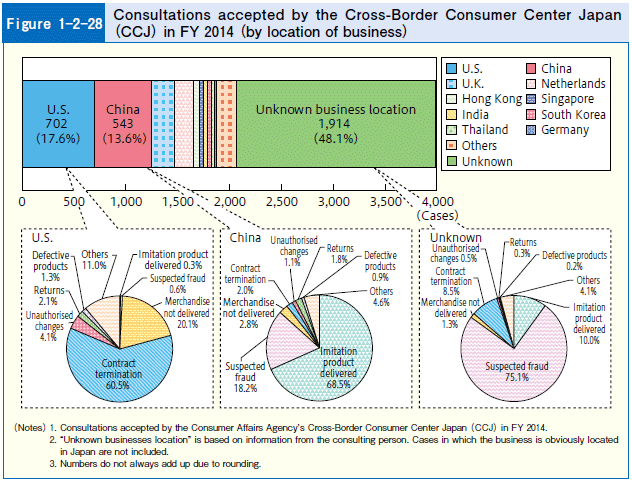Consumer issues associated with globalization
Part 1 : Today's consumer issues and consumers' behavior/attitude
Chapter 1 : [Feature] Globalization and consumer issues
Section 2 : Consumer issues associated with globalization
Many of the consultations on businesses outside Japan and imported goods are pertinent to China
- Consumer affairs consultations received by local consumer affairs centers across Japan include those on businesses outside Japan and imported goods, as well as those submitted by foreigners.
- For a decade since FY 2005, the largest part of these consultations have been pertinent to China, followed by the U.S. A majority of recent consultations concerning China are related to online stores (e.g., fake brand-name products, merchandise not delivered).
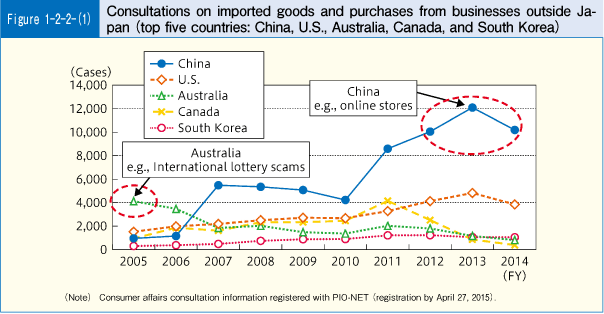
Import-related consultations on contract and cancellation are increasing
- Consultations on contract, cancellation, and sales methods have been growing recently.
For example, consumers complain that they cannot receive foreign brand-name products ordered at online stores or that they want to cancel purchase contracts of import cars due to frequent failures being experienced after the purchase. - Among import-related consultations, those concerning functionality & quality and safety & hygiene have been decreasing. This suggests that consumers have become able to receive safer and better-quality products than before because of efforts by businesses.
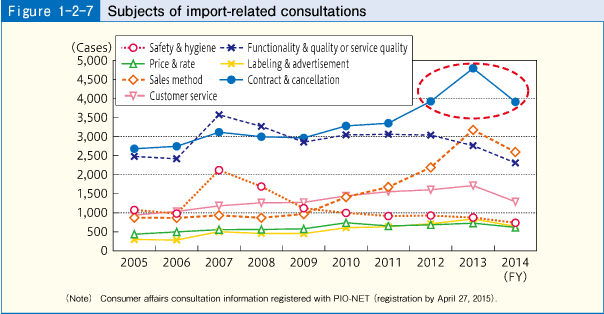
Many of consultations on online stores, such as fake products received and merchandise not delivered, are attributed to purchases from businesses outside Japan
- Since FY 2013, there has been a marked increase in the number of consultations on purchases from online stores, such as "I ordered a brand-name product at an online store but received a fake," and "I cannot receive the product I paid for."
- A large part of these consultations are pertinent to websites outside Japan, especially in China.
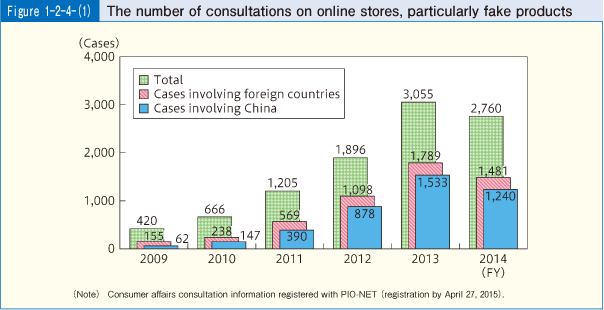
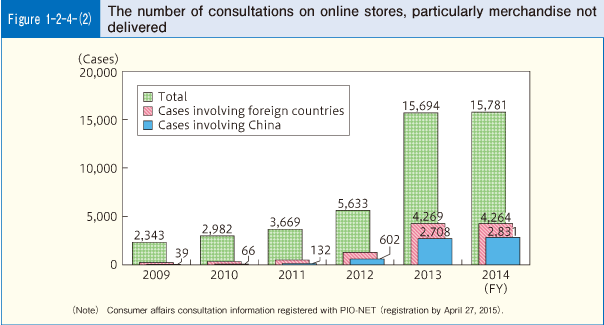
Consumer problems with online contracts for foreign travel increased
- A growing part of consultations on foreign travel are problems associated with online arrangements.
- Many of these consultations are pertinent to cancellation of reservations. Another common type of complaint is that consumers found after arriving at the travel destination that the quality of the hotel was not as good as they had been informed before.
- Another subject of consultation that has been increasing recently is that while traveling abroad, consumers were involved in trouble relating to "time share," which is a type of resort hotel membership with real property rights.
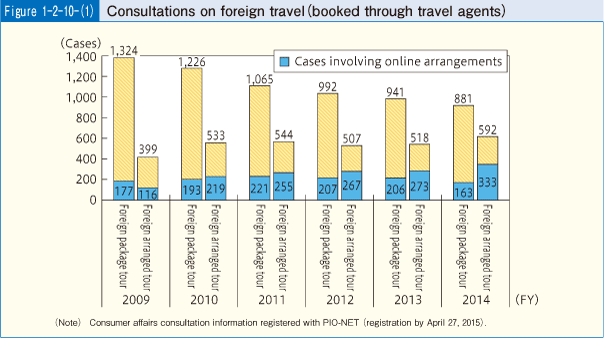
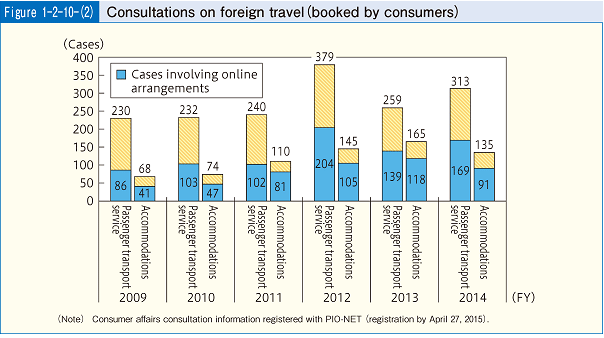
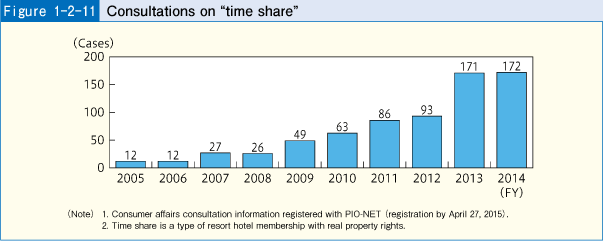
More problems are occurring from transactions of financial products with businesses outside Japan
- Problems associated with "binary option" trading with businesses outside Japan sharply increased in FY 2014, peaking in the July-September period. In binary options, investors make predictions about movements in foreign currency and choose from two investment options. If the prediction proves right, the investor will receive a specified amount of money, but otherwise the entire investment will be lost. At the beginning, consumers are told that they can easily make money in a short time. However, once they start, their loss will grow before they realize.
- A notable increase was also observed in the number of problems with FX trading with businesses outside Japan, which were experienced by investors who had purchased automatic trading software.
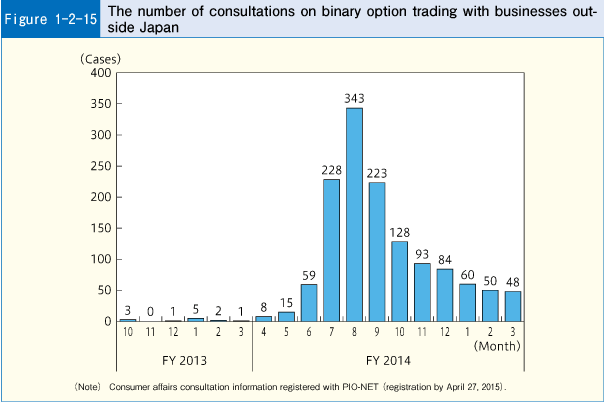
Consumer problems related to foreign currency trading involve diverse currencies
- Consumer problems in which foreign currencies with low liquidity are purchased with the yen have frequently occurred over the last few years.
- Similar tactics have been observed since FY 2009, but with the target currency changing over time.
- Various currencies have been involved to date, such as Iraqi dinars, Sudanese pounds, and Afghanistan afghani (although the frequency has reduced recently).
- In some cases, consumers were forced to accept an exchange rate more than 200 times that in the foreign exchange market.
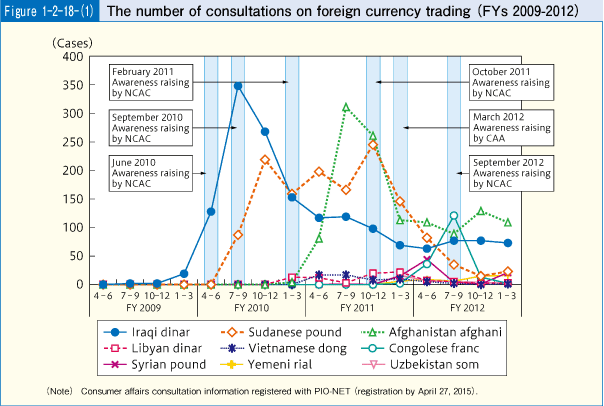
Many of consultations on cross-border trade are concerning online transactions
- The Consumer Affairs Agency's Cross-Border Consumer Center Japan (CCJ) accepted consultations on cross-border trade.
- Among 4,068 cases of consultation on cross-border trade handled in FY 2014, those concerning online transactions (e-commerce) accounted for 98.6%.
- Consultations on apparel (clothing, shoes, and accessories) accounted for the largest proportion.
- In many of the cases, consumers did not notice that they were dealing with businesses outside Japan until they faced problems because payments were made in yen or the website was written in Japanese.
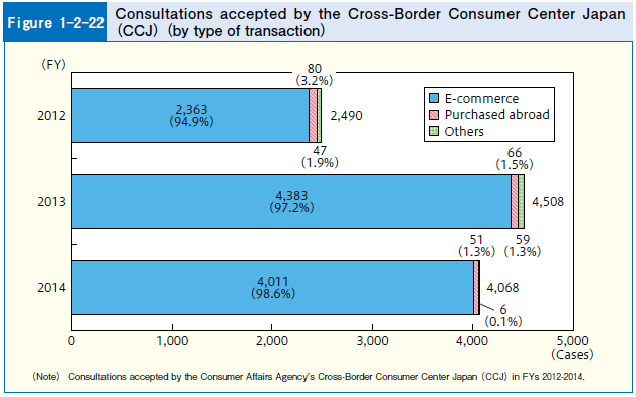
The nature of problems varies depending on the nationality of the business
- An analysis of consultations on cross-border trade by the location of business shows that the U.S. accounted for the largest part (17.6%), with 702 cases, in FY 2014, followed by China (13.6%), with 543.
- Among consultations on Chinese businesses, 86.7% were pertinent to imitation products and fraud (with "imitation product delivered" accounting for 68.5%, and "suspected fraud" for 18.2%).
- Among cases in which the location of the business was unknown, 75.2% were "suspected fraud," in which purchased goods were not delivered.
